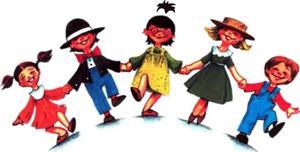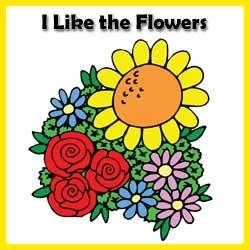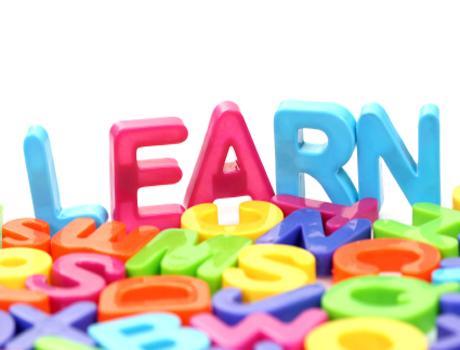| What Is Your Name? |
|
| Эта песенка поможет рассказать о себе по-английски. Разучив эту песенку, ребенок сможет рассказать, как его зовут, сколько ему лет и где он живет, а также расспросить об этом других.
Песенка позволяет перейти к простенькому рассказу о себе и диалогам, в которых дети представляются друг другу.
В том случае, если при ответе на вопрос « Where do you live?» придется назвать длинное слово, например St. Petersburg, посоветуйте малышу ответить более широко: «I live in Russia». |
|
| What is your name?
What is your name?
Now tell me, please,
What is your name?
My name is Barby,
My name is Barby,
My name is Barby,
That's my name.
How old are you?
How old are you?
Now tell me, please,
How old are you?
I'll soon be eight,
I'll soon be eight,
I'll soon be eight,
That's my age.
Where do you live?
Where do you live?
Now tell me, please,
Where do you live?
I live in London,
I live in London,
I live in London,
That's where I live. | wot iz jo: neim?
wot iz jo: neim?
nau tel mi:, pli:z,
wot iz jo: neim?
mai neim iz ba:bi,
mai neim iz ba:bi,
mai neim iz ba:bi,
ðæts mai neim.
hau ould a: ju:?
hau ould a: ju:?
nau tel mi:, pli:z,
hau ould a: ju:?
ail su:n bi: eit,
ail su:n bi: eit,
ail su:n bi: eit,
ðæts mai eidз.
wε∂ du: ju: liv?
wε∂ du: ju: liv?
nau tel mi:, pli:z,
wε∂ du: ju: liv?
ai liv in 'lΛnd∂n,
ai liv in 'lΛnd∂n,
ai liv in 'lΛnd∂n,
|
|
| I'm Six Years Old |
| Песенка поможет запомнить сравнительный оборот «as... as», формы прошедшего времени (Past Simple или Past Indefinite) глагола to be — быть во множественном числе (were) и способа сочетания глагола саn с глаголом, обозначающим действие (can reach).
После разучивания песенки целесообразно отработать вопрос: When you were only SIX years old, were you as TALL as I? При этом первое выделенное слово можно заменить другим числом, в зависимости оттого, сколько лет ребенку, а вместо tall — высокий подставить другие односложные прилагательные: clever — умный, nice — красивый, good — хороший, kind — добрый, strong — сильный, quick — быстрый, находчивый и т. д. Таким образом ребенок выучит немало слов. |
| I'm six years old,
And oh so big,
I can reach up this high;
When you were only six years old,
Were you as tall as I? | aim siks j∂:z ould,
ænd ou sou big,
ai kæn ri:t∫ Λр ðis hai;
wen ju: w∂r ounli siks j∂:z ould,
w∂: ju: æz to:l æz ai? |
|
| Apples and Bananas
I like to eat,
I like to eat,
Eat apples nad bananas.
I like to eat,
I like to eat,
Eat apples nad bananas. |
|
|
|
|
| My balloon
This is my red balloon,
My red red balloon.
Up it goes, pull it down!
Up it goes, pull it down!
This is my red balloon,
My red red balloon. |
|
| C - cake, cat, car |
|
| Pat-a-cake
Pat-a-cake, pat-a-cake, baker's man,
Bake me a cake as fast as you can.
Roll and pat it and mark it with C
And put it in the oven for cousin and me. |
|
| D - dog, duck, drum. |
|
| Where has my little dog gone?
Oh where, oh where has my little dog gone?
Oh where, oh where can he be?
With his ears cut short and his tail cut long,
Oh where, oh where can he be? |
|
| E -elephant, eye, egg |
|
| One elephant went out to play
One elephant went out to play,
Out on a spiders web one day.
He had such enormous fun,
He called for another elephant to come. |
|
| F - fly, flower, fish |
|
| Shoo fly
Shoo fly, don't bother me,
Shoo fly, don't bother me,
Shoo fly, don't bother me,
For I belong to somebody.
I feel, I feel, I feel, I feel like a morning star.
I feel, I feel, I feel, I feel like a morning star.
Shoo fly, don't bother me,
Shoo fly, don't bother me,
Shoo fly, don't bother me,
For I belong to somebody. |
|
| G - green, goat, giraffe |
|
| Little green frog
"Gung gung"went the little green frog one day,
"Gung gung"went the little green frog,
"Gung gung"went the little green frog one day,
And his eyes went "aah, aah, gung". |
|
| H - hand, house, hat |
|
| Clap your hands
If you're happy and you know it,
Clap your hands.
If you're happy and you know it,
Clap your hands.
If you're happy and you know it,
Then you face will surely show it,
If you're happy and you know it,
Clap your hands. |
|
| I - Indian, ice cream, ink |
|
| Ten little indians
One little, two little, three little Indians,
Four little, five little, six little Indians,
Seven little, eight little, nine little Indians,
Ten little Indian boys. |
|
|
|
| J - jelly, jam, juice |
|
| Jelly on a plate
The jelly on a plate,
The jelly on a plate,
Wibble, wobble, wibble, wobble,
Jelly on a plate. |
|
| K - kettle, kangaroo, key |
|
| Polly put hte kettle on
Polly, put the kettle on,
Polly, put the kettle on,
Polly, put the kettle on,
Let's all have tea.
Sukey take it off again,
Sukey take it off again,
Sukey take it off again,
They've all gone away. |
|
| L - lollipop, leaf, lamb |
|
| Lollipop
Lollipop, lollipop,
Oh lolli lolli lolli,
Lollipop, lollipop,
Oh lolli lolli lolli,
Lollipop, lollipop,
Oh lolli lolli lolli,
Lollipop. |
|
| M -man, monkey, milk |
|
| The muffin man
Oh, do you know the muffin man,
The muffin man, the muffin man?
Oh, do you know the muffin man,
Who lives across the way?
Oh, yes, I know the muffin man,
The muffin man, the muffin man.
Oh, yes, I know the muffin man
Who lives across the way. |
|
| N - nuts, nest, necklace |
|
| I had a little nut tree.
I had a little nut tree,
Nothing would it bear,
But a silver nutmeg and a golden pear.
The King of Spain's daughter
Came to visit me,
And all for the sake of my little nut tree. |
|
| O - owl, octopus, orange |
|
| This is the way
This is the way we climb a ladder,
Climb a ladder, climb a ladder,
This is the way we climb a ladder,
So early in the morning.
This is the way we pick oranges,
Pick oranges,pick oranges
This is the way we pick oranges,
So early in the morning.
This is the way we pick oranges,
Pick oranges,pick oranges
This is the way we pick oranges,
So early in the morning.
This is the way we peel oranges,
Peel oranges,peel oranges
This is the way we peel oranges,
So early in the morning.
This is the way we cook oranges,
Cook oranges, cook oranges
This is the way we cook oranges,
So early in the morning. |
|
| P-pig, pizza, piano |
|
| This little piggie went to market
This little pig went to market,
This little pig stayed at home,
This little pig had roast beef,
This little pig had none,
And this little pig cried, "Wee! Wee! Wee!Wee! Wee"
All the way home. |
|
| Q - quack, queen, quilt |
|
| Six little ducks
Six little ducks that I once knew
Fat ones, skinny ones, fair ones too
But the one little duck with the feather on his back
He ruled the others with a quack, quack, quack
Quack, quack, quack, quack, quack, quack
He led the others with a quack, quack, quack |
|
| R - rain, rabbit, rose |
|
| Rain, rain, go away
Rain, rain go away,
Come again another day,
Little children want to play so,
Rain, rain, go away. |
|
| S - spider, snake, star |
|
| Itsy bitsy spider
The itsy bitsy spider went up the water spout,
Down came the rain and washed the spider out,
Out came the sun and dried up all the rain,
And the itsy bitsy spider went up the spout again. |
|
|
|
| T - teddy bear, tiger, television |
|
| Teddy bear, Teddy bear, turn around.
Teddy bear, Teddy bear, touch the ground.
Teddy bear, Teddy bear, tie your shoes.
Teddy bear, Teddy bear, that will do.
Teddy bear, Teddy bear, go upstairs.
Teddy bear, Teddy bear, say your prayers.
Teddy bear, Teddy bear, turn off the light.
Teddy bear, Teddy bear, Say good night. |
|
| U -umbrella, underwear, unicycle |
|
| Rain on my umbrella
Drip, drip, drop, drop,
Drip, drip, drop, drop,
Drip, drip, drop,
Drip, drip, drop,
Rain on my umbrella,
Drip, drip, drop,
Drip, drip, drop. |
|
| V -village, volcano, violin |
|
| Round the village
Go round and round the village,
Go round and round the village,
Go round and round the village,
As we have done before. Go in and out the window,
Go in and out the window,
Go in and out the window,
As we have done before. |
|
| W - wolf, window, watch |
|
| Big bad wolf
Who's afraid of the big bad wolf,
Big bad wolf, big bad wolf?
Who's afraid of the big bad wolf?
Tra la la la la. |
|
| X - x-mas tree, xylophone |
|
| O, X-mas tree
O, Christmas tree,
O Christmas tree!
How evergreen your branches!
In summer's heat and winter's chill
Your leaves are green and growing still.
O, Christmas tree,
O Christmas tree!
How evergreen your branches
O, Christmas tree, O Christmas tree,
With much delight I see you.
When winter days are dark and drear,
You bring us hope throught the year.
O, Christmas tree,
O, Christmas tree,
With much delight I see you! |
|
| Y -yo-yo, yaht, yellow |
|
| What's this?
What's this?What's this?
What's this? What's this?
It's a yo-yo,
It's a yo-yo,
It's a yellow yo-yo.
What's this?What's this?
What's this? What's this?
It's a yaht,
It's a yaht,
It's a yellow yaht, yaht, |
|
| Z - zoo, sebra, zigzag |
|
| To the zoo
Daddy's taking us to the zoo tomorrow,
Zoo tomorrow, zoo tomorrow,
Daddy's taking us to the zoo tomorrow,
We can stay all day.
We are going to the zoo,zoo,zoo,
How about you, you, you?
You can come too, too, too,
We're going to the zoo. |
|
| Good morning to you
Good morning to you,
Good morning to you,
Good morning, Good morning
Good morning to you.
Good afternoon to you,
Good afternoon to you,
Good afternoon, Good afternoon
Good afternoon to you.
Good evening to you,
Good evening to you,
Good evening, Good evening
Good evening to you.
Good night to you,
Good night to you,
Good night, Good night
Good night to you.
|
|
| Days of the week
Sunday, Monday, Tuesday, Wednesday, Thursday, Friday, Saturday. |
|
| The months of the year
There are January,February,
March, April, May, June, July,
And August, September, October,
November, and December in a year. |
|
| Sing a song of a season
Sing a song of spring,
Flowers all around.
Sing a song of summer,
Sunshines all day long.
Sing a song of autumn,
Leaves on the ground.
Sing a song of winter,
Snowflakes everewhere. |
|
| How's the weather
How's the weather? It's sunny.
How's the weather? It's sunny.
How's the weather? It's sunny.
It's sunny today.
How's the weather? It's windy.
How's the weather? It's windy.
How's the weather? It's windy.
It's windy today.
How's the weather? It's cloudy.
How's the weather? It's cloudy.
How's the weather? It's cloudy.
It's cloudy today.
How's the weather? It's snowy.
How's the weather? It's snowy.
How's the weather? It's snowy.
It's snowy today. |





 Вошедшие в этот сборник английские детские песни хорошо известны малышам из англоязычных стран, кроме того, эти детские песни на английском языке с успехом используются для обучения английскому языку детей во всем мире. Несложная, мелодичная детская песня на английском — прекрасный помощник для начинающих изучать иностранный язык. Детская песня на английском языке облегчает запоминание множества слов и речевых оборотов, помогает освоить грамматику английского языка. Игровой элемент большинства английских песенок позволяет превратить занятие в настоящее удовольствие и для малышей, и для взрослых. Английские песенки подходят как для индивидуальных, так и для групповых занятий. Приступая к разучиванию песенки, взрослый может пропеть ее и рассказать, о чем она. Не стоит заставлять ребенка запоминать весь текст: вполне достаточно, если в день он будет осваивать по одному куплету. Дети хорошо заучивают английские детские песни, если ее строчки взрослый читает нараспев, максимально приближая их ритм к мелодии. Детям особенно нравится, когда взрослый начинает строчку, а ребенок ее заканчивает. Взрослый должен постепенно уменьшать произносимый им текст, пока ребенок не запомнит всю песенку. Важно, чтобы малыш почувствовал и усвоил мелодию английской песенки. Во время занятий ребенок повторяет и закрепляет свои знания, запоминает новые слова и обороты английского языка. Когда детская песня будет выучена, взрослый может попросить ребенка прочитать ее как стихотворение. Детские песни на английском языке развивают словарный запас, музыкальный слух, помогают запомнить грамматические конструкции, необходимые для развития речи.
Вошедшие в этот сборник английские детские песни хорошо известны малышам из англоязычных стран, кроме того, эти детские песни на английском языке с успехом используются для обучения английскому языку детей во всем мире. Несложная, мелодичная детская песня на английском — прекрасный помощник для начинающих изучать иностранный язык. Детская песня на английском языке облегчает запоминание множества слов и речевых оборотов, помогает освоить грамматику английского языка. Игровой элемент большинства английских песенок позволяет превратить занятие в настоящее удовольствие и для малышей, и для взрослых. Английские песенки подходят как для индивидуальных, так и для групповых занятий. Приступая к разучиванию песенки, взрослый может пропеть ее и рассказать, о чем она. Не стоит заставлять ребенка запоминать весь текст: вполне достаточно, если в день он будет осваивать по одному куплету. Дети хорошо заучивают английские детские песни, если ее строчки взрослый читает нараспев, максимально приближая их ритм к мелодии. Детям особенно нравится, когда взрослый начинает строчку, а ребенок ее заканчивает. Взрослый должен постепенно уменьшать произносимый им текст, пока ребенок не запомнит всю песенку. Важно, чтобы малыш почувствовал и усвоил мелодию английской песенки. Во время занятий ребенок повторяет и закрепляет свои знания, запоминает новые слова и обороты английского языка. Когда детская песня будет выучена, взрослый может попросить ребенка прочитать ее как стихотворение. Детские песни на английском языке развивают словарный запас, музыкальный слух, помогают запомнить грамматические конструкции, необходимые для развития речи.  like the flowers
like the flowers










